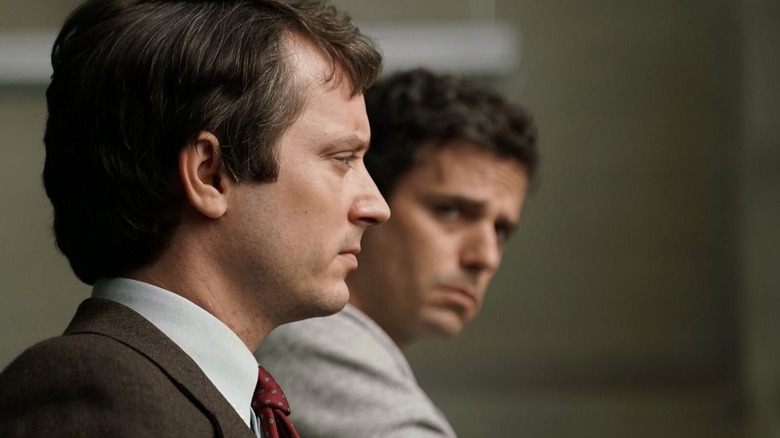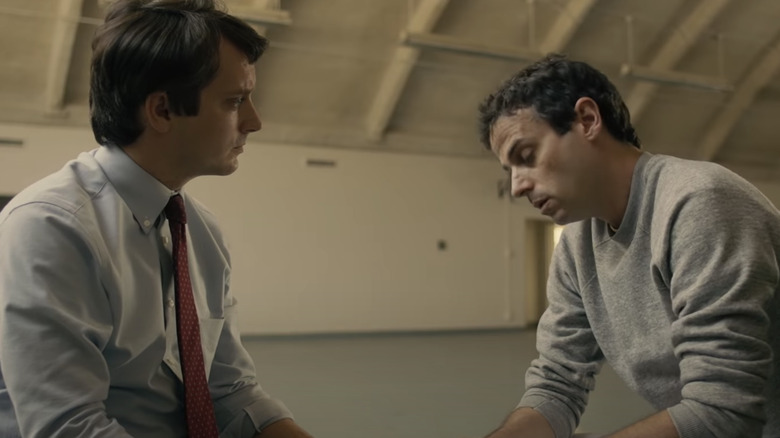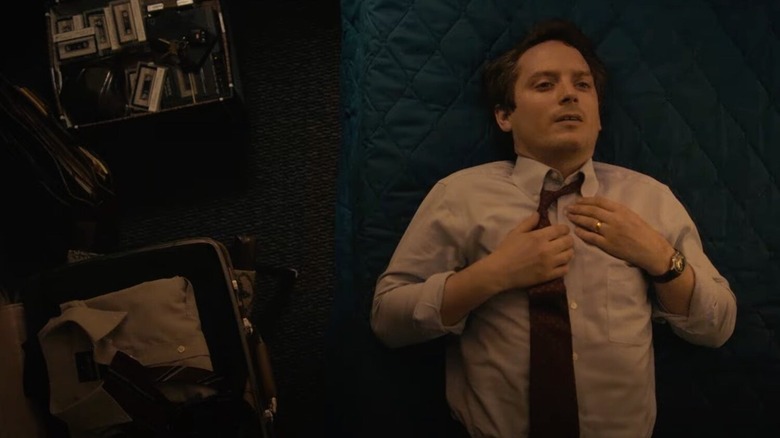No Man Of God Star Elijah Wood On What It Was Like To Play Ted Bundy's 'Best Friend' [Interview]
Elijah Wood has an elaborate dance to perform in Amber Sealey's "No Man of God." The actor and producer plays FBI agent Bill Hagmaier, who goes toe-to-toe with serial killer Ted Bundy (Luke Kirby) before his execution. The two engage in long conversations without revealing all their cards to each other. A lot is spoken and unspoken by the two men on the opposite sides of the law. The same applies to Wood and Kirby.
"No Man of God," which is now on VOD, is another film produced by Wood. For the last 11 years, Wood's production company SpectreVision has made a handful of genre favorites, including the Nicolas Cage-led "Mandy." Recently, the actor and produced told us about the company's vision for filmmakers, as well as his experience of playing Ted Bundy's "best friend" in this new horror-tinged drama.
"Ted Bundy was really the tip of the iceberg."
This is a very challenging movie. Pushes your buttons, just being that close to evil for such prolonged periods of time.
Yeah, yeah. Oh, that's really interesting. It's somewhat because the narrative is relatively naked. It's sparse. It's two men in a room for the majority of the film, and I think you're just hearing these conversations and these are conversations that happened very much like they are depicted in the film. I mean, they're based on recollections and transcripts, so it is kind of confronting, because there's no real artifice to it. It's just what is happening psychologically as you're understanding and witnessing it. So, yeah, I don't know if I would say that's the desired effect, but it certainly is an understandable effect in sitting with someone like that for a long period of time.
It throws the audience and you into the deep end, too. The first conversation, I'm not sure how many pages that was.
Oh boy.
Exactly. How'd you prepare for that scene?
Just the technical aspect was easily the most challenging I've had as an actor for just sheer volume of dialogue and work. Each of those meetings is somewhere between, well, I don't know, 10 to 15 pages, something like that. And an average scene in the film runs anywhere from two to six pages, so just the sheer volume of work between the two of us and unending takes of these very, very long extended conversations was just a lot to prepare for.
It was unique, because we didn't have the ability to prepare in person, because we were right in the middle of a pandemic, and so all of our rehearsals were done on Zoom. And actually Luke and I, prior to every work week, because we had rehearsals on Zoom with Amber working through each of those conversations and sort of the intention, what was being said, what wasn't being said in those conversations, which was so much for us to work with, which was a joy to sort of find all of that.
It was just the sheer volume of the work and getting our dialogue. So every weekend, for the most part prior to the week of work, we would run through all of the big scenes together on Zoom for like an hour or so just to get it, because we have just so much to learn.
But it was also, having been in lockdown essentially for about, I guess it would have been six months almost at that point, it was the first time any of us had been in a creative process in a long time. So it was also really joyful. As dark as the material is and as intense as it is, it was also really nice to go to work every day, and be amongst a crew of people, and work opposite Luke, who is so incredible, and engage in that creative process. It was really fun, too.
How much does Bill actually reveal himself to Ted Bundy, do you think? Is he playing a role or being genuine in those conversations?
I think you're seeing the real him. I think there's a performance from both of them for each other, but I do think you're getting a sense of who Bill really is in those scenes. But it is a dance, and it would have been for Bill at the time. The thing about Ted is that he didn't trust law enforcement, and Ted would slip up, so little things would happen.
An interesting anecdote about Bill and how he dealt with Ted, and for instance, like whenever Ted would refer to murders, he would refer to them in a third person, as if he didn't do them. So he would always be like this person or that person, or if I were to do this, this is what I would do, but he would rarely say I, and occasionally he would slip up and just forget himself, because of how comfortable he was around Bill, and he would say I. And what Bill would do, because he knew that that would totally throw it if Ted sensed that Bill had heard him refer, like slip up that way, which would have been a sign of weakness and also an admission was guilt, it would have thrown the whole thing off. So in those moments, Bill would pretend that the tape had stopped or he would get distracted by something to let the moment pass, and then Ted would readjust and get back into the story.
I guess that's to illustrate the kind of, not manipulation, but the tactics that were being used weren't necessarily like he was putting on a different version of himself. He was being himself, but just having to dance around the psychological needs of this particular individual. It was fascinating to play, and certainly daunting. Bill's alive, he's still alive, an incredible career that extends way beyond Ted Bundy. Ted Bundy was really the tip of the iceberg. Bill has done so much for so many people over the years. I did get to speak with him, which was incredibly helpful.
Obviously we would, under different circumstances, if we were not shooting during the pandemic, I would have loved to have gone back east and spent time with him. I wasn't afforded that opportunity, unfortunately, but that was always the plan. We were supposed to shoot this in April of last year and the pandemic pushed it, but we were going to go out and spend time with Bill, which would have been really, really lovely. But he was incredible as a resource and availed himself so much to not only me, but to Luke, as well, for specific Ted questions that he might have, and also so much for Amber just for accuracy. Which was amazing.
"He could tell that he was there for pure reasons."
When you first read the script or were talking to C. Robert Cargill about it, did you see it as a movie to potentially produce or to star in?
Only as a producer. Yeah, it wasn't until like three, four years down the road that my producing partners kind of brought it to my attention, which is often the case. I never read material that's brought to us from the perspective of working on it as an actor. I'm only ever thinking about producing it. Every single time it's always been my producing partners that have sort of shaken me and kind of go, "Well, you can look at this. Maybe you should do this." Which is what happened with this. But no, we were just excited at the notion of this part of Ted's life, the script that detailed a part of Ted's life in a relationship that we weren't familiar with was really interesting, that had nothing to do with the trial, nothing to do with his murders, but didn't depict the murders. It was specifically this really pared down almost, like, Ted Bundy meets "Frost/Nixon." Just a series of conversations and what transpires in those conversations. And that was just so fascinating, especially because it was based on the real conversations that the two of them had had.
How do you think Bill perceived Ted calling him his best friend?
That idea of Ted believing at the end of his life that Bill was his best friend is a really fascinating insight into Ted, as well. What it really says, I mean, Bill wasn't necessarily shocked, although Bill certainly didn't feel reciprocal. I know he didn't consider Ted to be his best friend, but what that says about Ted is that Bill just listened. What Bill did for Ted, and also Bill got a lot out of that, too, because he was able to finally get some answers for some of these families and for some of the law enforcement handling various murder cases, so there was obviously an agenda. On top of that, the agenda also was for the force to take what was learned psychologically and apply that to profiling in the future. Of course, he got that in spades.
But what Bill did for Ted was just listen. Ted was used to law enforcement, FBI wanting something out of him very specifically, and more often than not with an agenda to write a book later or profit off of that relationship. Ted knew that Bill was being honest when he said that. I think that's why at the end of his life, he considered Bill to be his best friend, because he could tell that he was there for pure reasons. That he wasn't there to get anything out of him, and he genuinely was curious from one human being to another human being. And it was so much in fact, that Ted willed all of his earthly possessions to him, which wasn't a whole lot at the end of his life. So Bill was briefly given all of his earthly possessions, which he then, I think he gave to Ted's sister, or a family member. I mean because he didn't feel like he earned that or wanted to keep those things. He didn't have any emotional attachment to Ted Bundy's things. It just shows how deep that relationship ran for Ted.
You've said before with acting and producing, you want to keep church and state separate. Why is that?
Well, first off, I didn't want to initially, when we started the company, SpectreVision specifically, I didn't want it to be seen outwardly as a sort of vanity project for me to find projects for myself in acting. I really wanted that the merits of the project be determined based on the work that we made and not based on me, and that the identity of the company was the films and the filmmakers, not the people behind the team. It was really important to me. Out of the gate, that was my perspective.
And then the identity takes on a life of its own after a number of films and people have a sense of what it is that you are, although very early on I was in a movie called Cooties, maybe it was the second movie we made.
I also just genuinely don't think about it. It's not a personal mandate anymore. When we get to submissions, or if we're thinking about filmmakers that we want to work with or reach out to them, I'm only ever just thinking about working on their films as a producer. It's not even an effort anymore. I always just have that hat on, but I have to actively take that hat off to think about it from a different perspective.
But again, initially it was really to, out of the gate, not confuse what we were trying to do with being an avenue specifically for me to work on films as an actor. That was the primary thing at the beginning, and then I'm just used to reading scripts from that perspective now.
"No Man of God" is currently available on VOD.


